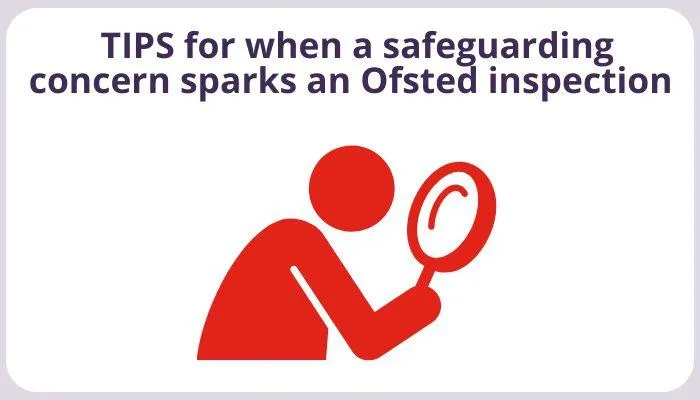Every child's well-being matters.
Best Practice Ideas for Safeguarding Articles
Quick Access

What if a safeguarding concern triggers an Ofsted inspection?
Safeguarding concerns can lead to unannounced Ofsted inspections. Being prepared at all times is essential. Here’s a simple guide to handling these inspections before, during, and after they happen. This list is however not exhaustive, and you should remain up-to-date with current legislation and inspection frameworks.
Preparation: Always Be Ready
Ofsted inspections as a result of a safeguarding complaint or concern can happen without notice, so readiness is key.
Policies and Procedures
Regularly update safeguarding policies to align with current legislation.
Ensure all staff know the policies and how to apply them.
Documentation
Keep safeguarding records, staff training logs, and incident reports complete and up-to-date.
Proper documentation demonstrates compliance and readiness.
Staff Communication
Regularly brief staff on safeguarding practices and how to handle inspector questions.
Conduct frequent training sessions to keep knowledge fresh.
During the Inspection
Cooperate Fully
Provide inspectors with any requested documents and information promptly.
Be open and honest during discussions about safeguarding policies.
Show Evidence of Training
Present records of staff safeguarding training.
Highlight additional support or refresher training provided to staff.
Demonstrate a Safeguarding Culture
Show that safeguarding is embedded in daily practices.
Share examples of how concerns are reported and resolved.
After the Inspection
Review Feedback
Carefully read the inspection report to understand strengths and areas for improvement.
Share findings with staff, governors, and stakeholders.
Create an Action Plan
Address recommendations with clear steps, deadlines, and assigned responsibilities.
Monitor progress to ensure improvements are effective.
Communicate with Stakeholders
Be transparent with parents and carers about inspection results and improvement plans.
Use the opportunity to build trust and reinforce commitment to safeguarding.
Additional Tips
Stay Calm and Organised
Avoid panic, as it can lead to mistakes.
Seek support from the local authority or consultants if needed.
Focus on Improvement
Use the inspection as a chance to enhance safeguarding practices.
Continuously review and refine policies to ensure a safe environment.
By staying prepared, transparent, and proactive, you can handle unannounced Ofsted inspections effectively and use them to strengthen safeguarding measures.
AUTHOR:- Iona has nearly 10 years of experience supporting nurseries and childminders in curriculum planning, leadership, and safeguarding. Her writing is informed by public information and sector insight, aiming to provide accessible, practical support for professionals working with children. She is part of the On the Button team, helping deliver Well-being, Safeguarding and Complaint Management Software that empowers practitioners to identify concerns early and act confidently.
On the Button provides innovative software tailored to the needs of the early years sector, with a strong focus on EYFS well-being and early years safeguarding. Our tools help senior practitioners to confidently track concerns, maintain robust records, and respond effectively — all while meeting statutory guidance. From early years complaint management to team-wide safeguarding alerts, our platform puts children's safety and emotional health first.
Quick Access

What if a safeguarding concern triggers an Ofsted inspection?
Safeguarding concerns can lead to unannounced Ofsted inspections. Being prepared at all times is essential. Here’s a simple guide to handling these inspections before, during, and after they happen. This list is however not exhaustive, and you should remain up-to-date with current legislation and inspection frameworks.
Preparation: Always Be Ready
Ofsted inspections as a result of a safeguarding complaint or concern can happen without notice, so readiness is key.
Policies and Procedures
Regularly update safeguarding policies to align with current legislation.
Ensure all staff know the policies and how to apply them.
Documentation
Keep safeguarding records, staff training logs, and incident reports complete and up-to-date.
Proper documentation demonstrates compliance and readiness.
Staff Communication
Regularly brief staff on safeguarding practices and how to handle inspector questions.
Conduct frequent training sessions to keep knowledge fresh.
During the Inspection
Cooperate Fully
Provide inspectors with any requested documents and information promptly.
Be open and honest during discussions about safeguarding policies.
Show Evidence of Training
Present records of staff safeguarding training.
Highlight additional support or refresher training provided to staff.
Demonstrate a Safeguarding Culture
Show that safeguarding is embedded in daily practices.
Share examples of how concerns are reported and resolved.
After the Inspection
Review Feedback
Carefully read the inspection report to understand strengths and areas for improvement.
Share findings with staff, governors, and stakeholders.
Create an Action Plan
Address recommendations with clear steps, deadlines, and assigned responsibilities.
Monitor progress to ensure improvements are effective.
Communicate with Stakeholders
Be transparent with parents and carers about inspection results and improvement plans.
Use the opportunity to build trust and reinforce commitment to safeguarding.
Additional Tips
Stay Calm and Organised
Avoid panic, as it can lead to mistakes.
Seek support from the local authority or consultants if needed.
Focus on Improvement
Use the inspection as a chance to enhance safeguarding practices.
Continuously review and refine policies to ensure a safe environment.
By staying prepared, transparent, and proactive, you can handle unannounced Ofsted inspections effectively and use them to strengthen safeguarding measures.
AUTHOR:- Iona has nearly 10 years of experience supporting nurseries and childminders in curriculum planning, leadership, and safeguarding. Her writing is informed by public information and sector insight, aiming to provide accessible, practical support for professionals working with children. She is part of the On the Button team, helping deliver Well-being, Safeguarding and Complaint Management Software that empowers practitioners to identify concerns early and act confidently.
On the Button provides innovative software tailored to the needs of the early years sector, with a strong focus on EYFS well-being and early years safeguarding. Our tools help senior practitioners to confidently track concerns, maintain robust records, and respond effectively — all while meeting statutory guidance. From early years complaint management to team-wide safeguarding alerts, our platform puts children's safety and emotional health first.

What if a safeguarding concern triggers an Ofsted inspection?
Safeguarding concerns can lead to unannounced Ofsted inspections. Being prepared at all times is essential. Here’s a simple guide to handling these inspections before, during, and after they happen. This list is however not exhaustive, and you should remain up-to-date with current legislation and inspection frameworks.
Preparation: Always Be Ready
Ofsted inspections as a result of a safeguarding complaint or concern can happen without notice, so readiness is key.
Policies and Procedures
Regularly update safeguarding policies to align with current legislation.
Ensure all staff know the policies and how to apply them.
Documentation
Keep safeguarding records, staff training logs, and incident reports complete and up-to-date.
Proper documentation demonstrates compliance and readiness.
Staff Communication
Regularly brief staff on safeguarding practices and how to handle inspector questions.
Conduct frequent training sessions to keep knowledge fresh.
During the Inspection
Cooperate Fully
Provide inspectors with any requested documents and information promptly.
Be open and honest during discussions about safeguarding policies.
Show Evidence of Training
Present records of staff safeguarding training.
Highlight additional support or refresher training provided to staff.
Demonstrate a Safeguarding Culture
Show that safeguarding is embedded in daily practices.
Share examples of how concerns are reported and resolved.
After the Inspection
Review Feedback
Carefully read the inspection report to understand strengths and areas for improvement.
Share findings with staff, governors, and stakeholders.
Create an Action Plan
Address recommendations with clear steps, deadlines, and assigned responsibilities.
Monitor progress to ensure improvements are effective.
Communicate with Stakeholders
Be transparent with parents and carers about inspection results and improvement plans.
Use the opportunity to build trust and reinforce commitment to safeguarding.
Additional Tips
Stay Calm and Organised
Avoid panic, as it can lead to mistakes.
Seek support from the local authority or consultants if needed.
Focus on Improvement
Use the inspection as a chance to enhance safeguarding practices.
Continuously review and refine policies to ensure a safe environment.
By staying prepared, transparent, and proactive, you can handle unannounced Ofsted inspections effectively and use them to strengthen safeguarding measures.
AUTHOR:- Iona has nearly 10 years of experience supporting nurseries and childminders in curriculum planning, leadership, and safeguarding. Her writing is informed by public information and sector insight, aiming to provide accessible, practical support for professionals working with children. She is part of the On the Button team, helping deliver Well-being, Safeguarding and Complaint Management Software that empowers practitioners to identify concerns early and act confidently.
On the Button provides innovative software tailored to the needs of the early years sector, with a strong focus on EYFS well-being and early years safeguarding. Our tools help senior practitioners to confidently track concerns, maintain robust records, and respond effectively — all while meeting statutory guidance. From early years complaint management to team-wide safeguarding alerts, our platform puts children's safety and emotional health first.
Quality Early Years Ltd.,
Dickens House,
Guithavon Street,
Witham, Essex,
England, CM8 1BJ
© Quality Early Years Ltd 2025

Find On the Button
on Social Media

